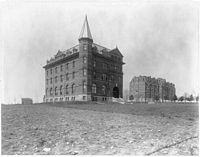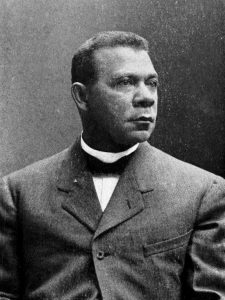In class on Thursday, I mentioned potential issues with the readings from Krehbiel and Jackson. While differing in their overall intentions and attitudes towards African American music, both step into pitfalls we often see with early ethnographic and ethnomusicology research: they try to engage with other cultures from an “academic”, western-central perspective. Rather than engaging with spirituals on their own terms, they attach western concepts of musical ownership and authorship to an aural tradition that was communally shared amongst African Americans.

A photograph of Fisk University
A contrary model for how we might engage with spirituals comes from Booker T. Washington. In an address on behalf of Fisk University -a historically based black university in Nashville, Tennessee- Booker T. Washington contextualizes what Fisk Day (May 19, 1905) signifies, relating it to “The Songs of Our Fathers”, and titles it as such. Washington starts his address by invoking the image of slaves coming across the Atlantic and connecting it to what he views as the cultural significance of Spirituals. “…It is from these songs of our fathers, that their children of past generation… have received the inspiration that has imbued them with courage to have faith that right may win…” (1). Washington continues this line of thought with a literary analysis of a preacher, quoting and alluding to well-known hymns and spirituals without needing to mention them by name. He contextualizes them, inviting people to think about the spiritual in the mindset of a slave. “What encouragement to the patiently waiting slaves had been the faith songs that had banished the sight of the auction block, the separation of mother and child, father and mother…” (2).
In concluding his address, Washington makes the penultimate argument that Fisk day honors “the sacrifices, loving devotion and a belief in the possibilities of a despised people…” (3). While this address does not have the academic citations or research behind it that Krehbiel or Jackson exhibit in their writing, it serves as a model for how to engage with spirituals. Rather than focusing on the who, what when of spirituals, Washington focuses on the why and how which is all the more relevant to understanding the musical and cultural practice.
(1) “The Songs of Our Fathers. An Address Delivered on Fisk Day during the Louisiana Purchase Exhibition.” Plaindealer (Topeka, Kansas) VII, no. 20, May 19, 1905: [3]. Readex: African American Newspapers. https://infoweb.newsbank.com/apps/readex/doc?p=EANAAA&docref=image/v2%3A12A7EF1A4AC47F2D%40EANAAA-12C8B913302F6748%402416985-12C8B9134BFB71A0%402-12C8B913A0F80C58%40The%2BSongs%2Bof%2BOur%2BFathers.%2BAn%2BAddress%2BDelivered%2Bon%2BFisk%2BDay%2Bduring%2Bthe%2BLouisiana%2BPurchase%2BExhibition.
(2) “The Songs of Our Fathers. An Address Delivered on Fisk Day during the Louisiana Purchase Exhibition.”
(3) “The Songs of Our Fathers. An Address Delivered on Fisk Day during the Louisiana Purchase Exhibition.”

